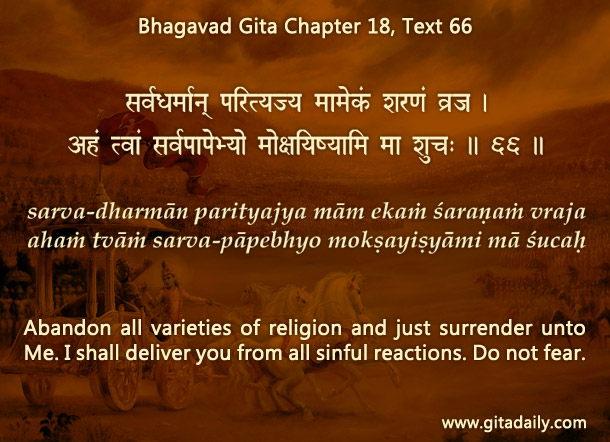
Some Gita interpreters highlight the word ‘vraja’ in the Bhagavad-gita’s concluding verse (18.66), emphasizing that its literal meaning is ‘go’, not ‘come.’ That Krishna wants Arjuna to surrender and go, not come, means that surrender is meant to be directed toward some divinity other than Krishna. Or so they claim.
It’s true that ‘vraja’ often means ‘go’, but it also generically means ‘walk.’ The pastoral paradise of Vrindavana is referred to in short as Vraja; it is a place where everyone is walking or is active. And the Gita itself uses a variant of ‘vraja’ in this generic sense of motion (02.54: vrajeta): Arjuna enquires how the self-realized move about in the world. And this generic meaning of ‘vraja’ gels well with the Gita’s vision of surrender: a surrendered Arjuna is to actively do the will of the Divine in the world, not passively meditate on the Divine by retreating from the world.
Moreover, this sense of active surrender works just as well even if we take ‘vraja’ to mean ‘go.’ In the context of 18.66, ‘vraja’ doesn’t have to refer to the object of surrender; it can also refer to the mode of surrender. That is, ‘surrender and go’ doesn’t have to mean: surrender to some unspecified divinity other than Krishna. It can also mean: surrender by going into the world and doing Krishna’s will.
This world-engaging sense of ‘go’ is not just acceptable, but more sensible in the Gita’s physical setting. For learning the Gita, Arjuna has turned away from the battlefield toward Krishna; for living the Gita, a surrendered Arjuna needs to turn back toward the battlefield and therein do Krishna’s will. And that indeed is what Arjuna says he will do (18.73) — and what he does, as revealed in the Mahabharata’s description of the subsequent Kurukshetra war.
Thus, when Krishna urges Arjuna to ‘surrender and go’, the ‘go’ doesn’t imply that the object of surrender is some divinity other than Krishna; it implies that the mode of surrender is active and engaged in the world, not passive and turned away from the world.
Think it over:
- How does the generic meaning of ‘vraja’ gel well with the Gita’s vision of surrender?
- What can the literal meaning of ‘vraja’ as ‘go’ refer to?
- Which of these meanings makes greater sense in the Gita’s context?
***
18.66: Abandon all varieties of religion and just surrender unto Me. I shall deliver you from all sinful reactions. Do not fear.
To know more about this verse, please click on the image



…precious jewels of wisdom – I am so indebted to You…
… One should always think himself helpless and should consider Krishna the only basis for his progress in life.
Helpless indeed we are.
Hare Krishna 🙏
Ys,